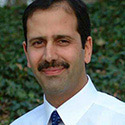Background
Dr. Raffit Hassan earned his medical degree from the University of Kashmir in India. He completed his internal medicine residency at Sisters Hospital at the University of Buffalo, and his medical oncology fellowship at the National Institutes of Health (NIH) Clinical Center.
Dr. Hassan currently serves as a tenure track investigator for the National Cancer Institute (NCI) in Bethesda, Maryland. His special area of interest is targeted immunotherapy for the treatment of malignant mesothelioma.
Dr. Raffit Hassan is excited about the promising potential that new therapies hold. He works to offer these cutting-edge treatments to his patients with mesothelioma.
Research
Dr. Hassan chose to work for the NCI because it enables him to receive adequate funding for mesothelioma research. Many other research institutions do not receive proper funding to study the disease because it is so rare.
With this support, Dr. Hassan has gone on to produce many ground-breaking treatments, including a monoclonal antibody drug and a cancer vaccine for mesothelioma. He is working to improve these treatments to optimize their effectiveness and minimize side effects.
Dr. Hassan has been recognized for his work with several awards, including the American Society of Clinical Oncology’s Career Development Award, the NIH’s Patient Oriented Research Career Development Award, and the Mesothelioma Foundation’s Pioneer Award.
Searching for a Cure
The rareness of mesothelioma has made it difficult to run large clinical trials to make more rapid progress in treating the disease and finding a cure. Still, Dr. Hassan says the progress we’ve made has been significant and rewarding. He is excited about the promising potential that new therapies hold and works to offer these cutting-edge treatments to his patients with mesothelioma.


 Rae Steinbach
Rae Steinbach
 Lauren Weinand
Lauren Weinand